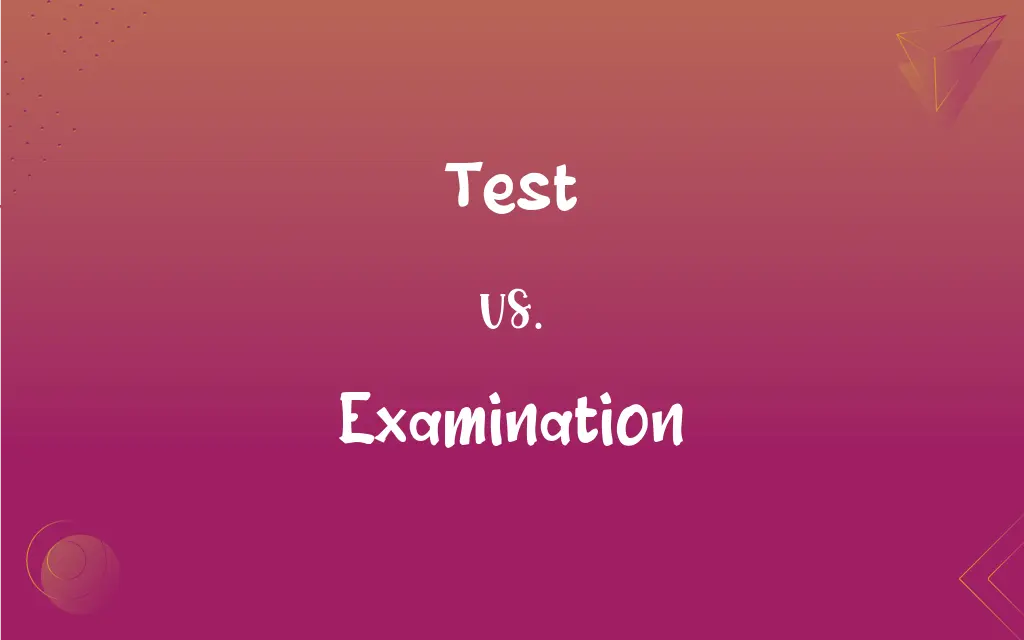Test vs. Examination: What's the Difference?
Edited by Aimie Carlson || By Harlon Moss || Published on November 19, 2023
A test is a brief assessment to measure specific skills or knowledge, while an examination is a more comprehensive evaluation of understanding in a subject area.

Key Differences
A test often focuses on assessing a specific skill, knowledge area, or performance under particular conditions. An examination, in contrast, typically evaluates broader knowledge or understanding of a more extensive subject matter or domain.
Tests are generally shorter and might occur frequently, such as weekly quizzes in a classroom setting. Examinations are lengthier, often marking the end of a term or course, and encompass a wider range of topics or skills.
While both tests and examinations aim to evaluate, a test might be used for quick checks, progress tracking, or even diagnostics. Examinations are more formal, determining final grades, certification, or qualification in various fields.
Tests usually provide immediate or rapid feedback, helping learners identify areas that need improvement. Examination results might take longer and are often accompanied by detailed performance metrics or rankings.
Tests can be informal, like a pop quiz in class or a quick skill test during a job interview. Examinations are structured, with set formats, durations, and often in controlled environments, like exam halls.
ADVERTISEMENT
Comparison Chart
Primary Focus
Specific skills, knowledge area, or performance.
Broader knowledge or comprehensive understanding of a subject.
Duration and Scope
Shorter and focused.
Lengthier, covering a wider range of topics.
Purpose and Usage
Quick checks, progress tracking, diagnostics.
Formal evaluations, final grades, certification.
Feedback and Results
Rapid or immediate feedback.
Might take longer, with detailed metrics or rankings.
Setting and Format
Can be informal, varied settings.
Structured, set formats, often in controlled environments.
ADVERTISEMENT
Test and Examination Definitions
Test
A procedure intended to establish the quality, performance, or reliability of something.
The company conducted a test to check the durability of the product.
Examination
A formal test of a person's knowledge or proficiency in a particular subject or skill.
The university entrance examination was quite challenging.
Test
A means of establishing the presence or absence of a particular phenomenon.
The doctor ordered a blood test for cholesterol levels.
Examination
A detailed inspection or investigation.
The doctor conducted a thorough examination of the patient.
Test
A short written or spoken examination of a person's proficiency or knowledge.
She aced the math test last week.
Examination
An assessment intended to measure a candidate's ability to perform specific tasks or skills.
The driving examination was nerve-wracking for her.
Test
An event or situation that reveals the strength or quality of someone or something by putting them under strain.
Their relationship faced its first major test.
Examination
The act of examining or the process of being examined.
The examination of evidence is crucial in any investigation.
Test
An attempt to do something to see if it is possible or effective.
Let's give this solution a test to see if it works.
Examination
A systematic analysis of something.
His book offers a detailed examination of the economic impacts of climate change.
Test
A procedure for critical evaluation; a means of determining the presence, quality, or truth of something; a trial
A test of one's eyesight.
Subjecting a hypothesis to a test.
A test of an athlete's endurance.
Examination
The act of examining or the state of being examined
The examination of the evidence.
Test
A series of questions, problems, or physical responses designed to determine knowledge, intelligence, or ability.
Examination
A set of questions or exercises testing knowledge or skill.
FAQs
What is the primary purpose of a test?
A test measures specific skills, knowledge, or performance.
Why are tests used in schools?
Tests are used for quick checks, progress tracking, and diagnosing learning gaps.
How is an examination different from a quiz?
An examination evaluates broader knowledge, while a quiz is a shorter test focusing on specific topics.
What's the significance of examinations in higher education?
Examinations determine grades, certifications, and qualifications in various fields.
Can tests be oral or just written?
Tests can be both oral and written, depending on the context.
Do all tests have time limits?
Not all, but many tests are timed to assess performance under constraints.
What's the goal of a proficiency examination?
To assess a candidate's capability or mastery in a specific skill or subject area.
Are examinations always long?
Not always, but examinations typically cover a wider range of topics and are lengthier than tests.
Can tests be subjective?
Yes, some tests, especially those evaluating qualitative skills or perspectives, can be subjective.
Are examinations only written?
No, examinations can be oral, practical, or written, depending on the subject and context.
What's a practical test?
A test assessing hands-on skills, like a lab experiment or a driving test.
Can a test be an examination?
Yes, all examinations are tests, but not all tests are comprehensive enough to be termed examinations.
Can examinations be informal?
Typically, examinations are formal, but the level of formality can vary based on context.
Do tests always have scores?
While many tests provide scores, some might offer qualitative feedback or a pass/fail outcome.
What's a diagnostic test?
It identifies the presence, quality, or cause of a particular phenomenon or condition.
Who conducts examinations?
Examinations can be conducted by educational institutions, certification bodies, or professional organizations.
Are examinations always stressful?
Not necessarily, but due to their significance, many individuals may find them stressful.
Can tests be used outside of the educational context?
Yes, tests can evaluate products, processes, or even psychological conditions.
How often are examinations conducted?
It varies, but examinations are often at the end of terms, courses, or certification programs.
Why are examination results significant?
They impact decisions like grade promotions, job qualifications, or professional certifications.
About Author
Written by
Harlon MossHarlon is a seasoned quality moderator and accomplished content writer for Difference Wiki. An alumnus of the prestigious University of California, he earned his degree in Computer Science. Leveraging his academic background, Harlon brings a meticulous and informed perspective to his work, ensuring content accuracy and excellence.
Edited by
Aimie CarlsonAimie Carlson, holding a master's degree in English literature, is a fervent English language enthusiast. She lends her writing talents to Difference Wiki, a prominent website that specializes in comparisons, offering readers insightful analyses that both captivate and inform.






































































